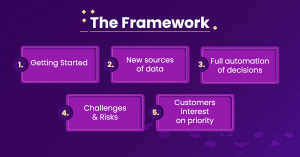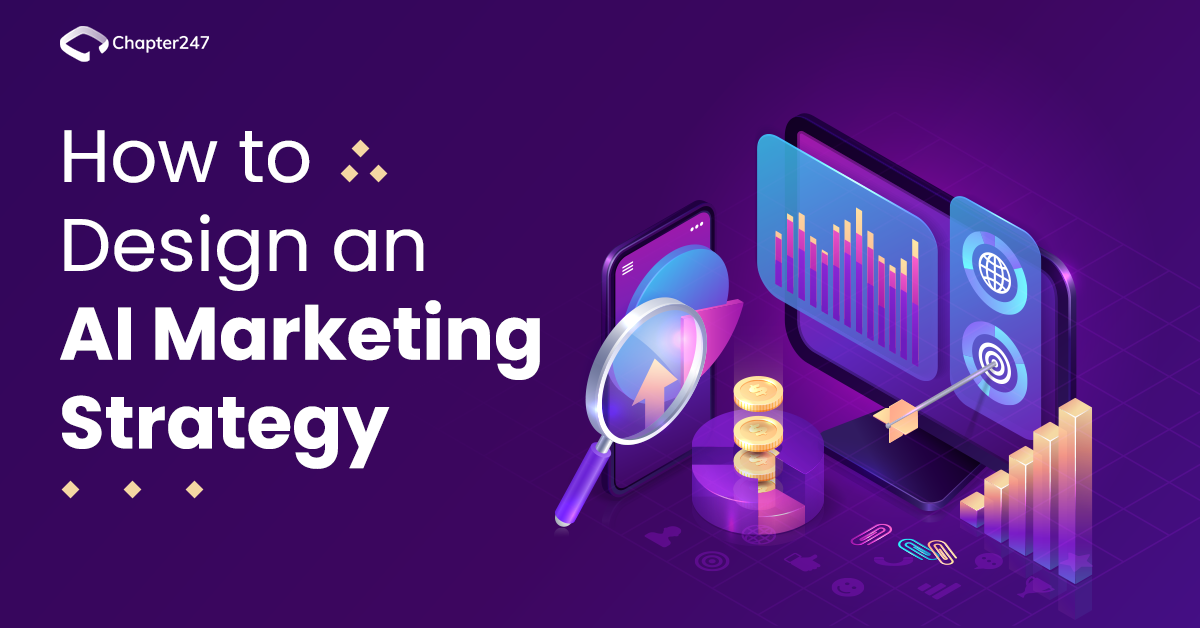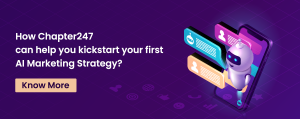For every business to grow, marketing is extremely important. It’s about three key parts: understanding what your customers need, matching those needs to products and services, and persuading them to buy. In order to realize marketing’s giant potential, CMOs need to have a good grasp of the various kinds of applications available, especially AI and how they may evolve.
This article will help you understand the present and future of marketing & AI, from a marketing perspective, as well as how to effectively roll out your current projects and plan for future ones. It would be hard to overstate the impact AI will have on your marketing techniques. Marketing has a lot to gain from AI and there are so many different kinds of AI out there.
Well-Established AI Applications in Marketing
- Chatbots, inbound call routing and analysis, customer comment classification and responses.
- Marketing campaign automation including cross-selling, upselling
- Lead generation
- Marketing mix analysis
- Online product merchandising
- Pricing
- Programmatic digital ad buying
- Television ad placement
- Sales lead scoring
- Social-media planning, buying, and execution
- Social-media sentiment analysis
- Web analytics narrative generation
- Website operation and optimization (including testing)
The Framework

Marketing AI can be separated into two different categories: their intelligence level, and whether they’re used stand-alone or as part of a much more extensive program. Some techs such as chatbots or recommendation engines can be classified in any of the categories. It’s up to you how they are implemented in your app and where they’ll fit best.
There are four quadrants that can be derived when considering machine-learning and task automation: 1) stand-alone machine-learning apps; 2) integrated machine-learning apps; 3) stand-alone task automation apps; 4) integrated task automation apps. Understanding Quadrant applications and how they can be integrated into a marketing plan will allow you to save time, effort and money by allowing you to sequence the introduction of new use cases.
Getting Started
If you’re at a point in your business where you are looking to automate some everyday tasks, but don’t have the necessary AI experience yet, first rule-based applications might be your best way to start. Many companies start with a standalone task-automation app, such as one that guides customer service agents. This saves time and improves the quality of the company’s interactions with customers.
Once you get the basics of AI and have a lot of customer & market data, it’s time to start going from task automation to machine learning. If that sounds like something you might be interested in, take a look at these other features of Stitch Fix’s AI-powered service. This has really paid off because Style Shuffle has been able to accumulate new data that users can use to create their own photos.
New sources of data
Marketing teams need to be constantly aware of all company data sources, including internal transactions and outside suppliers, as well. Latest AI applications, such as machine learning programs, require a lot of high-quality data.
Consider the machine-learning fueled pricing model used by the XO charter jet company to increase their EBITDA by 5%: They managed to do so through tapping external sources for data on the supplies of private jets and factors that affect demand, such as major events or in this case things. We understand that the data XO uses is publicly available, but it’s a good idea to also seek out more private sources. Models that use public data can be copied by competitors.
Full automation of decisions
Technology is becoming so advanced, companies are implementing AI marketing decisions that remove humans entirely from the equation. For example: One company fully automated its TV advertising decisions with an AI engine. Manual decision-making is time intensive and tedious; AI offers a faster, more efficient alternative. Programmatic ad buying (serving digital ads up on the get go to customer) often requires quick decisions on who, what, when and where to target. Machine learning can provide that instantaneously through its constant learning process without anyone having to need it all by themselves.
In a lot of other fields, AI can only be recommended. It might do that for consumers by giving them movie recommendations or for big marketing execs by suggesting strategies.
At work, decisions regarding funding campaigns and approving expensive TV ads are typically relegated to human decision-making. We believe that companies should try to automate these decisions as much as possible. Ultimately, this will help with what is currently the most coveted skill in the workplace: analytical reasoning.
Challenges and Risks
Even though AI apps are technically simpler than before, they can still be hard to configure. Stand-alone task automations need companies to acquire suitable AI solutions. There are new ways of integrating AI seamlessly into a workflow. This is achieved by carefully dividing tasks between AI & humans to make sure that the AI is doing what it’s good at and that humans can do what they’re great at.
For example, while many companies are content with relying on rule-based chatbots to offer customer service, less efficient bots can lead to greater levels of dissatisfaction. These bots may be better used by human customer service specialists or agents. As companies adopt more sophisticated & integrated platforms, other considerations arise. Throwing AI into 3rd party platforms can be tricky.
Customers interest on priority
Companies need to take into account the concerns customers may have around privacy, security, and ownership of their data. The more AI is able to integrate with other aspects of a company, the more worries these customers may have.
Customers can sometimes be paranoid about products capturing data they don’t want to share, or that they may think are monitoring them without their knowledge. People are willing to exchange some of their privacy in order to get the benefits that innovative apps have to offer.
How Chapter247 can help you kickstart your first AI Marketing Strategy?
There are many ways we can help you in implementing AI in your marketing strategy. Our experienced team can help provide consultation and advice on how to use AI products and services along with the right implementation. Additionally, providing a range of other services such as, data analytics, digital marketing, web design, search engine optimization etc., our team is sure to give you 360 degree support in all your marketing activities and hit the bull’s eye with expected ROIs. Get in touch with us to learn more.








